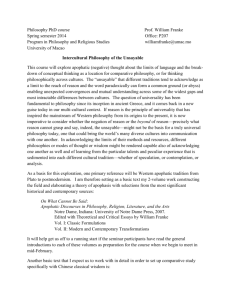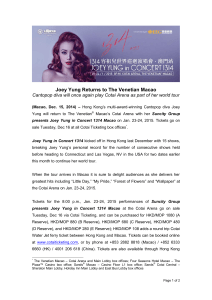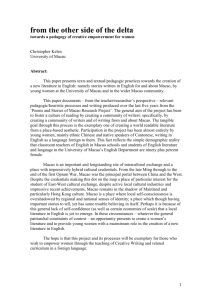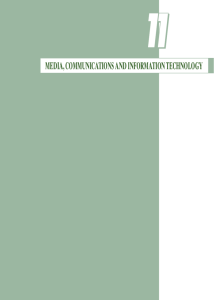Book Colloquium Proposal and Rationale
advertisement
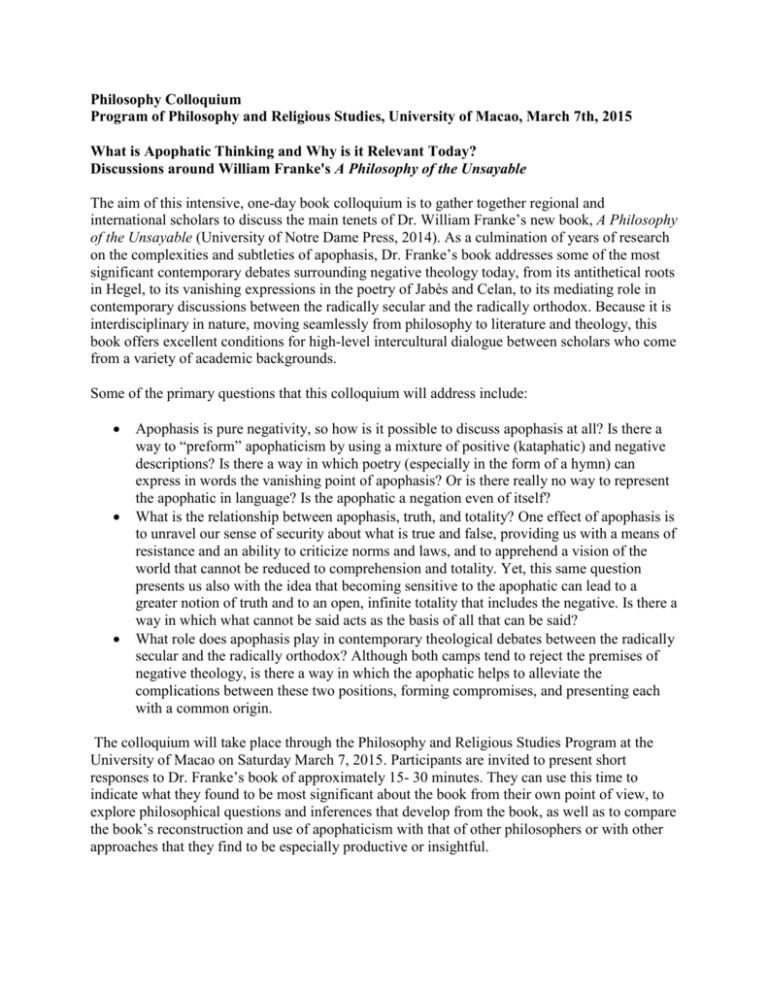
Philosophy Colloquium Program of Philosophy and Religious Studies, University of Macao, March 7th, 2015 What is Apophatic Thinking and Why is it Relevant Today? Discussions around William Franke's A Philosophy of the Unsayable The aim of this intensive, one-day book colloquium is to gather together regional and international scholars to discuss the main tenets of Dr. William Franke’s new book, A Philosophy of the Unsayable (University of Notre Dame Press, 2014). As a culmination of years of research on the complexities and subtleties of apophasis, Dr. Franke’s book addresses some of the most significant contemporary debates surrounding negative theology today, from its antithetical roots in Hegel, to its vanishing expressions in the poetry of Jabès and Celan, to its mediating role in contemporary discussions between the radically secular and the radically orthodox. Because it is interdisciplinary in nature, moving seamlessly from philosophy to literature and theology, this book offers excellent conditions for high-level intercultural dialogue between scholars who come from a variety of academic backgrounds. Some of the primary questions that this colloquium will address include: Apophasis is pure negativity, so how is it possible to discuss apophasis at all? Is there a way to “preform” apophaticism by using a mixture of positive (kataphatic) and negative descriptions? Is there a way in which poetry (especially in the form of a hymn) can express in words the vanishing point of apophasis? Or is there really no way to represent the apophatic in language? Is the apophatic a negation even of itself? What is the relationship between apophasis, truth, and totality? One effect of apophasis is to unravel our sense of security about what is true and false, providing us with a means of resistance and an ability to criticize norms and laws, and to apprehend a vision of the world that cannot be reduced to comprehension and totality. Yet, this same question presents us also with the idea that becoming sensitive to the apophatic can lead to a greater notion of truth and to an open, infinite totality that includes the negative. Is there a way in which what cannot be said acts as the basis of all that can be said? What role does apophasis play in contemporary theological debates between the radically secular and the radically orthodox? Although both camps tend to reject the premises of negative theology, is there a way in which the apophatic helps to alleviate the complications between these two positions, forming compromises, and presenting each with a common origin. The colloquium will take place through the Philosophy and Religious Studies Program at the University of Macao on Saturday March 7, 2015. Participants are invited to present short responses to Dr. Franke’s book of approximately 15- 30 minutes. They can use this time to indicate what they found to be most significant about the book from their own point of view, to explore philosophical questions and inferences that develop from the book, as well as to compare the book’s reconstruction and use of apophaticism with that of other philosophers or with other approaches that they find to be especially productive or insightful. List of Invited Participants Anthony C. Adler, Associate Professor of German and Comparative Literature. Yonsei University, aadler@yonsei.ac.kr Nahum Brown, Post-Doctoral Fellow in Philosophy, University of Macao, nahum@uoguelph.ca William Franke, Professor of Philosophy and Religions, University of Macao, Professor of Comparative Literature and Italian and Professor of Religious Studies, Vanderbilt University, WilliamFranke@umac.mo William Christian Hackett, Research Fellow/Lecturer, Australian Catholic University, William.Hackett@acu.edu.au Andrew Hass, Reader in Religion, University of Stirling, andrew.hass@stir.ac.uk Sabine Lenore Müller, Researcher and Lecturer in Comparative Literature, Universität Leipzig, slmueller@uni-leipzig.de Stephen R. Palmquist, Professor of Philosophy, Hong Kong Baptist University, stevepq@hkbu.edu.hk Karl-Heinz Pohl, Professor Emeritus, Universität Trier, pohlk@uni-trier.de James Wang, Professor of Philosophy, Chinese University of Hong Kong, qjwang@cuhk.edu.hk Mario Wenning, Assistant Professor of Philosophy, University of Macao, mwenning@umac.mo Hideko Mitsui, Assistant Professor, University of Macao, hidekomitsui@umac.mo
